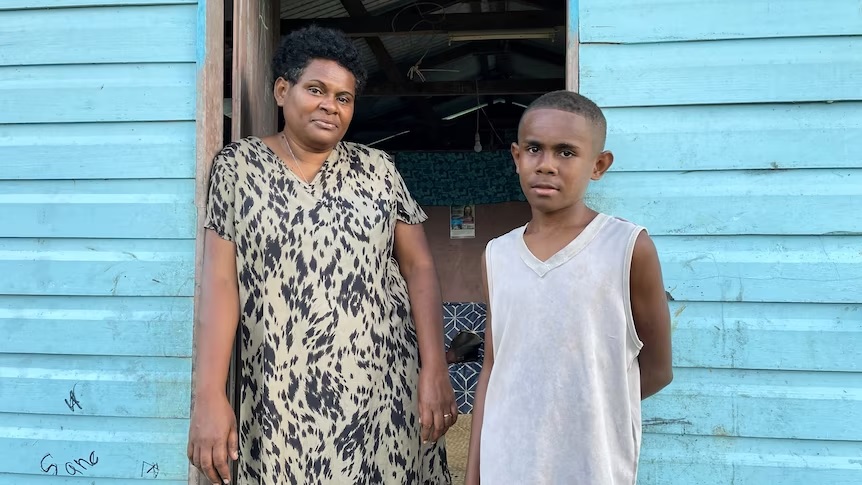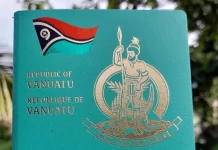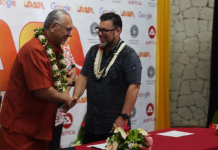The evenings are always the hardest for Nai Misipeka.
Alone with her five children, after cooking and cleaning, she puts them to bed.
With Fiji four hours ahead of Western Australia, the time difference means by the time her husband John gets off work their conversations are almost always tinged with sadness.
“When he calls he ask how about the children and I say, the children are asleep, and we both get emotional,” she told the ABC from her village just outside Suva.
“And then the tears come.
“I really miss him.”
Her husband John is one of a near-record 38,000 Pacific Islanders working on farms, abattoirs and aged care in Australia as part of the Pacific Australia Labour Mobility scheme, more commonly known as the PALM scheme.
As well as propping up Australia’s agricultural economy, the scheme has changed the lives thousands of Pacific Islanders, enabling them to earn wages they never could dream of in their home countries.
It has built new beginnings.
But it is also breaking families.
Workers can be away for up to four years, and the story of broken homes and broken marriages is becoming so common, Jioseta Vetaukula wrote a song about it.
It’s called Ilavo ni Aussie Ilavo Mosimosi and translated in English to The Aussie Dollar is a Painful Dollar.
“It’s hard work in Australia,” he said.
“You’re away for a long time. You think about your family everyday, you miss them.”
The song is one of Fiji’s biggest hits this year.
“It was hard to write, I had my own experience working there.
“It’s slang, Ilavo ni Aussie Ilavo Mosimosi, it’s what Fijians say when they’re out there working on the farms.
“It’s big money, out there, but it’s tough work.”
The PALM scheme concept itself dates back to 2007, then known as the Seasonal Worker Program. When COVID hit Australia’s once-reliable source of seasonal labour, backpackers, evaporated and the agricultural sector turned to the Pacific.
Thousands of Pacific Islanders streamed into the country, and the program has been expanding rapidly, with workers now able to work in Australia for nine months to four years.
“I think it’s the ultimate win-win,” Minister for the Pacific Pat Conroy told the ABC.
“Australia benefits by having our labour shortages filled by some of our closest neighbours, the workers win by picking up much needed skills and [on average] send home $15,000(US$9,658) per year.”
Whilst the vast majority of employers and workers say the scheme is mutually beneficial, it has been dogged with persistent stories of exploitation around the accommodation provided, the work itself and services provided by employees.
Pacific Islanders themselves have often struggled with the adaption required to work in Australia, while absconding has long been an issue.
And with its rapid expansion, it is causing major social issues in Pacific countries, with the ABC hearing dozens of stories of broken marriages and strained relationships because of the scheme.
In Fiji, there’s even slang associated with extramarital affairs, with the word “lasa ituba” abbreviated to “Aussie LT” meaning the “other partner” in Australia.
In the Pacific the exodus to Australia is causing major headaches.
Pacific leaders raise it regularly, with Samoa’s prime minister recently stating it was rivalling climate change as the “number one” issue the country faced.
She said country’s like hers should not been seen merely as “outposts” which “grow” labourers for developed nations.
As of 31 July, 38,259 Pacific Islanders are working in Australia through the scheme, down from a record of almost 40,000 in June. At the start of the year the figure was around 20,000.
The Australian government wants the scheme to grow and has pushed back on criticisms that it was causing brain drain, saying Pacific leaders had the power to control or cap how many workers they allowed overseas.
In a country like Tonga, the workers make up a staggering 6 per cent of the total population of the country.
According to business owners in Tonga it is creating gaping holes in the workforce.
“My turnover is too numerous to count,” Tanoa Hotel Tonga manager Jason Strickland told the ABC.
“It’s not equated to poor management, it’s equated to people leaving overseas in big groups and I’m sure other businesses are experiencing this.
“Essentially I feel like I’m running a hotel school.”
Strickland said he had “no issue” with people moving to chase better opportunities.
He said the problem was highly-qualified staff moving overseas because the money was better, meaning, ironically, he’s had to turn to other countries to fill the void.
“I don’t think the answer is for businesses to stamp their feet and ask these schemes to stop, I think they’re here to stay,” he said.
“But If you are going to take my chefs or my receptionists or my front office staff overseas and give them opportunities, I think they would be better suited in hotels and restaurants, rather than meat packing and agriculture.”
The issue has extended to Tonga’s major hospital.
Nurse manager Meleinu Felise said as well as moving overseas to work in the aged care sector, some nurses were opting to work in Australia picking fruit.
“As we all know, nurses are moving around because of better pay ‘on the other side’,” she said.
“They’re looking for a better life.
“But they say they want to come back, and they will come back, because their families are here. As we all know, in Tonga, we have obligations.
“I hate to say it [but] if worse comes to worse, we’ll get overseas workers, Pacific Islanders, to come and do a month here.”
Back in Fiji, Nai Misipeka and her five children have learnt to adapt without their husband and father.
The children do more in the garden and Nai brings in help from the community where she can.
The money John has made through the scheme has enabled them to lay-buy a new washing machine — the rest has gone on food.
But, with another three years of work ahead, they have plans to build an extension on their home.
“The money is good, but the important thing to us is our children,” she said.
“I want us, my family, to go to Australia [for the duration of his work] and support my husband. As soon as he’s finished, we come back.”
The Australian government has recognised this, introducing a “trial” of 200 long-term PALM scheme workers being able to bring their families to Australia.
Conroy said he recognised for some families the separation was “tough”.
“[The trial] is aimed at dealing with that dislocation impact being reported to us,” Conroy said. “And we have to work with communities to make sure it’s in their interests to participate.
“But overwhelmingly [this] has been positive for the Pacific, this is helping people out of poverty, and that’s why it’s so important.”
With her husband still months away from a short trip home for Christmas, Nai has a message for him.
“John, we will always love you. We miss you.
“Be strong, and know that we will work hard at what needs to be done here so we are here when you come home.”
A lucrative dollar, but a painful one.
SOURCE: ABC PACIFIC/PACNEWS














